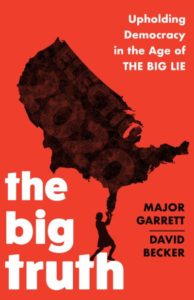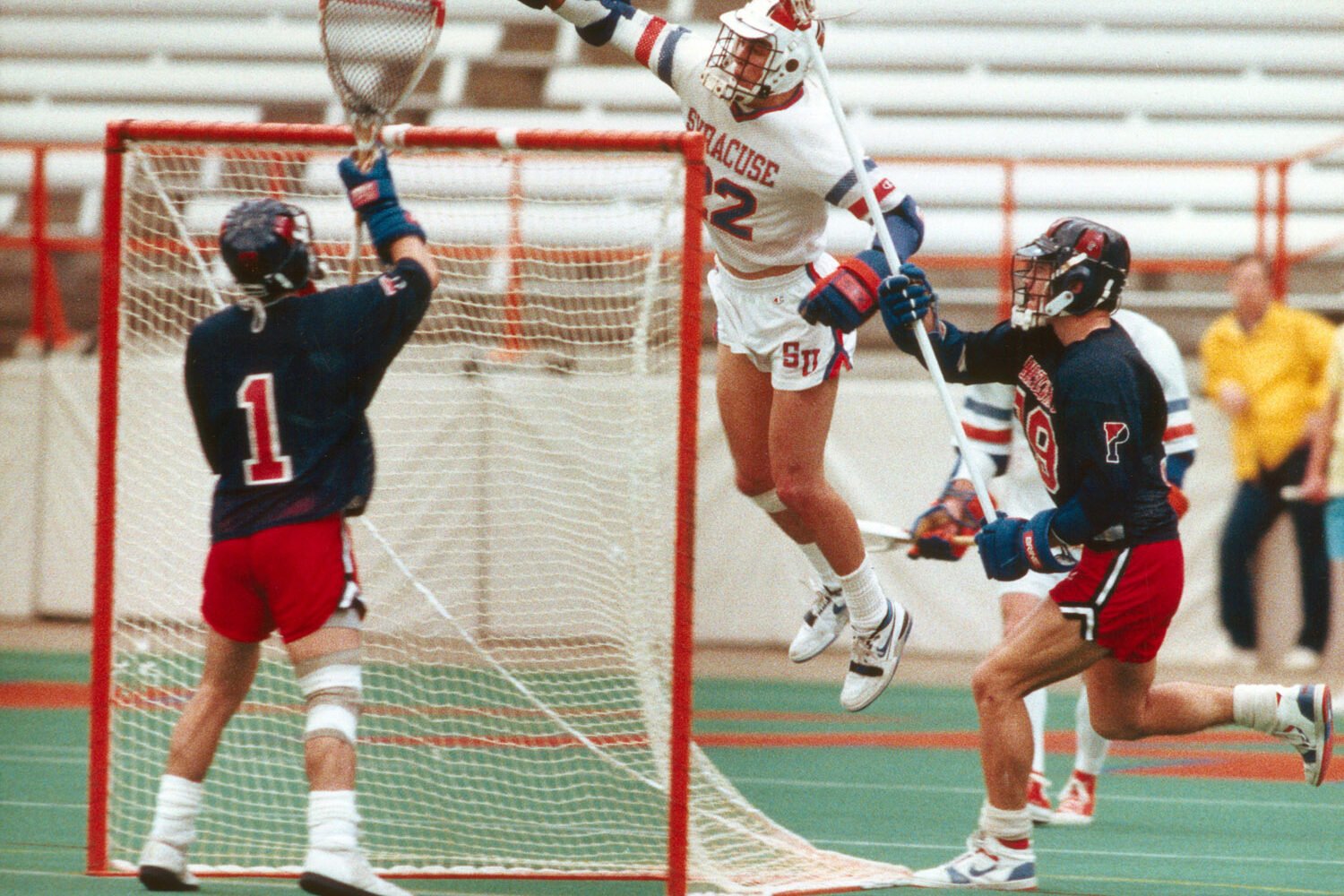David Becker is an elections evangelist: Democracy, he says, is our nation’s “civic religion,” and elections are its “holy day.” He’s spent his career championing elections—first as a voting-rights attorney with the Justice Department, then by leading the election team at the Pew Charitable Trusts. Lately, he’s passionate about supporting election officials, the unsung public servants who make democracy run. In 2016, he founded the Center for Election Innovation & Research to help election workers of both parties do their jobs, and more recently he’s been connecting besieged staffers with legal and communications support through the Election Official Legal Defense Network.
This fall, Becker and CBS News’s chief Washington correspondent, Major Garrett, published a book they coauthored called The Big Truth. In it, they argue that the 2020 election was the most secure in American history. Nonetheless, the Big Lie has pushed election deniers to run for key offices, intimidate election officials, and even attempt to tamper with voting equipment. “Election denial destroys the fabric of a democracy,” Becker says. “If a losing candidate cannot accept defeat, then we’re lost as a democratic society.”
How did you first get into working on elections?
In the late ’90s, I was a lawyer in Los Angeles doing entertainment litigation, and I was in the office at 10 PM on a weeknight, looking through boxes of documents and wondering if that was my entire future. So I decided to apply for my dream job, thinking I would not get it and then could just resign myself to being a law-firm lawyer for the rest of my life. My dream job was to be a voting-rights attorney for the United States Department of Justice—to use my law degree to protect the most vulnerable among us and make sure they have a voice.
You ended up getting that job and moving to DC. What did you learn about elections working at the DOJ?
As a Justice Department attorney, you go into places where you think there are [election] problems, investigate, and ultimately sue. Often the defendants are election officials. What I discovered is that there were some bad actors, but most of the election officials were incredibly dedicated. They really wanted people in both parties—people of a variety of backgrounds—to participate in the democratic process. Sometimes they just needed some help; they were under-resourced, they were overworked.
I got to know this community really well and further understand how much we rely on them. Our entire government relies upon secure, transparent elections, professionally run. And the objective fact is that right now, our election officials in this country are as professional as they’ve ever been. Our elections are as secure as they have ever been. Our elections are more transparent than they have ever been.

You write in your book that the 2020 election was the “greatest triumph in the history of American democracy.” Why is that?
In 2020, we had the highest turnout [in raw numbers] we’ve ever seen, by a large margin, in any election in American history. And this was all taking place, incredibly, in the middle of a global pandemic. Let’s think about that for a moment. We had election officials literally scrambling to find the money to pay for things like plexiglass shields; hand sanitizer; extra mail ballots and a way to process those mail ballots; extra staff at early voting sites; and all of the other things they needed. And they weren’t planning elections over Zoom—you can’t administer an election socially distanced from your staff—so people on election staffs were getting sick. They ran an election with fewer staff and resources than they normally would have. They somehow managed.
You also point out that 2020 was uniquely secure because such a high percentage of voters cast paper ballots.
The only way to confirm that a voter’s ballot was counted correctly by the machines that we use—and the machines do a very good job, but you always want to confirm it—is with the paper ballot. This is because we have a secret ballot, so you can’t go back to the voter and say, “We think you voted for candidate A. Did you vote for candidate A?”
In 2016, about three-fourths of all voters in the United States had a paper ballot. But Georgia and South Carolina, and much of North Carolina and Pennsylvania, did not. In 2020, all of those places moved to full paper ballots—so in every single battleground state, every voter cast a paper ballot. And in every one of those states, a portion of those ballots were hand-counted to confirm that the tabulators worked correctly and the count was accurate. It was. We’ve never had that level of transparency in an election, because we’ve never had that many paper ballots in audit.
Then came the scrutiny—because the loser didn’t like the fact that he lost. So we saw an unprecedented number of post-election cases, many of which were before Republican or Trump-appointed judges. And every single one of them unanimously found zero evidence to suggest the election wasn’t decided appropriately. Despite that success—despite that they ran such a clean election that over 60 court cases upheld it—election officials have been subjected to nearly two years of abuse, harassment, and threats. It is one of the great tragedies of American history that instead of throwing a parade for these public servants, they have been doxxed, they’ve had to move their kids to different schools, they’ve had to take different routes to work.
Is this why the Election Official Legal Defense Network is necessary?
Yes. I talk to election officials all the time, and they were experiencing some vicious threats—threats to themselves, to their staff, to their facilities, to their families, to their children. Specific threats. And local law enforcement was not adequately protecting them. In some cases, local governments or local law enforcement were actually the source of some of the threats and harassment. When we get requests from election officials, we pair them with lawyers to advise and assist them. It’s often not litigation—often they just need advice. You know, “My sheriff is about to break down my door and try to gain illegal access to my voting equipment—what do I do?”
And that’s a plausible example?
Yeah, that’s a plausible example. I’ve had calls from election officials who felt physically threatened, people who had to hang up because their homes were under siege. These are not made-up hypotheticals. These actually happened. And by the way, it hasn’t let up—if anything, it’s ramping up.
When I go and speak to election-official conferences, people are weary. And one of the weird dynamics is that this is probably affecting Republicans at least as much as Democrats. Because a lot of times, the grifters have gone to deeply red counties to try to con the county board into giving them illegal access to voting machines. And election officials have done their best to try to prevent it. They’ve done a very good job.
The Election Official Legal Defense Network recently started doing communications work. Why do election officials need PR help?
They’re being overwhelmed with disinformation that they need to correct—like that drop boxes aren’t secure or that a certain type of pen shouldn’t be used. These are all real things that have happened. And most election offices are relatively small; they probably don’t have a communications staffer, so we connect them with a communications professional that we have under retainer. We hear from election offices that their capacity to deliver truthful, trustworthy information to their voters is sometimes overwhelmed by the capacity of those who would want to spread disinformation. And hopefully, this will even out the playing field somewhat.
What would you say to someone whose concerns about voter suppression might make them skeptical that 2020 was such a triumph for democracy?
I mean, it’s easy to claim voter suppression, but it’s hard to document it. And there’s been very little documentation of that. Democracy is too important for us to be hurling slogans back and forth at each other, either of which might have the effect of delegitimizing elections in the eyes of many American voters. I want to be very clear: Voter suppression does exist to some degree. It happens. But for the vast majority of voters, it has never been easier to vote. More people have access to mail ballots now than they’ve ever had in American history. More people have access to early voting, automatic voter registration, same-day registration, and online voter registration than they’ve ever had in American history.
That doesn’t mean we’ve crossed the finish line; it doesn’t mean we’re done improving. It’s just that we’re better than we’ve ever been. And if you’re going to suggest that the outcomes of elections are being affected by voter suppression, you’ve got to come with evidence, just like if you’re going to suggest that they were affected by fraud.
What about a more structural objection to our elections? For example, the Electoral College doesn’t always reflect the will of the majority of voters.
So this book was not intended to be an overall assessment of American democracy. Certainly, people have legitimate issues with things like the Electoral College or the US Senate. But we did not and could not address all of that. The message of the book is that when you cast your ballot, you should have confidence that election officials will accurately determine the winner under the rules that we have at that time.
If you don’t like the rules, that’s legit. But whether you like the rules or not, you knew what they were on Election Day—and you can’t whine and complain about them after the fact if you lost. I mean, I can recruit the best quarterback and lose the Super Bowl by a point, but I can’t complain that field goals were only worth three and not four points. I knew what the rules were going into the game.
In the book, you call elections a “civic altar” and argue that protecting democracy should be our nation’s priority. How would you defend that to somebody whose priority is something else, like justice or religious values?
Democracy isn’t the end goal. It’s just a means to achieve all those end goals. Autocracies can’t deliver justice. Fascist movements can’t deliver justice—they don’t want to deliver justice. Democracies don’t always deliver justice. But they can sometimes.
We need democracy in order to move to a more just society, however anyone defines that. Democracy is an incredibly important tool, but I don’t believe that’s the end of it—I don’t believe that if democracy is working perfectly, everything magically is fixed. Democracy is a tool to make these changes over time. And there’s been no other form of government that does that, as imperfect as it is.
This article appears in the November 2022 issue of Washingtonian.
















